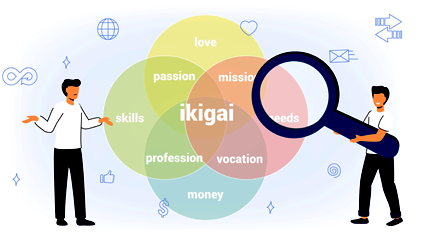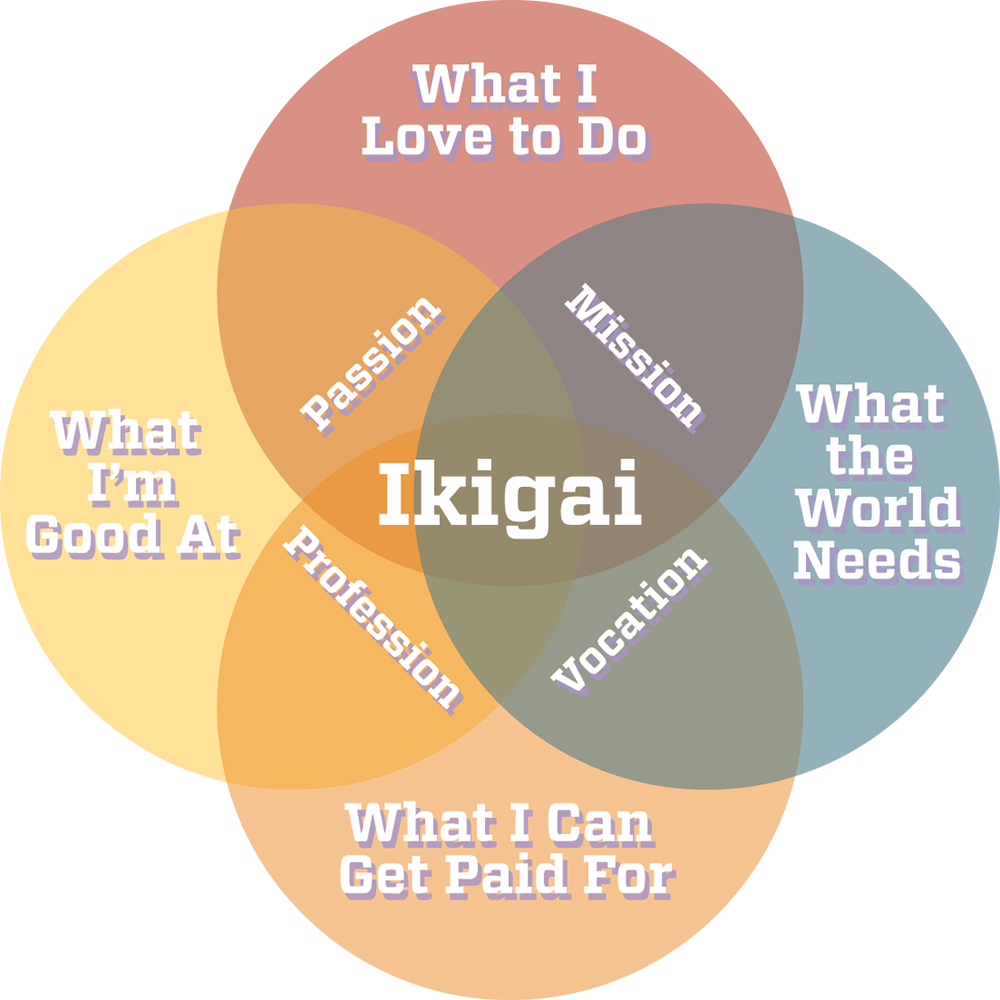What Do You Want To Be When You Grow Up? Part 1
June 25, 2024 - By Rick Robb, MFA. Sr. Student Success Specialist at UNM Online

Remember when you were a kid, and grownups would ask what you wanted to be when you grew up? You may have said things like “an astronaut” or “a ballerina” or “a basketball star” or “a unicorn!” A very small number of us wound up being those things (well, maybe not the unicorn) but for the most part, our interests shifted, and, at some point, people didn’t ask that question anymore. Then we found we’d become grownups and panicked a little because we weren’t really sure what we wanted to be. This post is the first of two about considering what you want to be after you graduate and how to plan for it.
I should note that, while the suggestions in this post may seem to be geared toward those with little job experience, the older student who is looking to change careers can also benefit from the concepts.
In my 15 years working in higher education, I’ve talked with countless students who were working toward a degree. For many of those students, their goal was to “just get a diploma,” but they had not considered what they would do with that piece of paper once they had it. You might have a general idea of what you want to do after the big day, but while you’re still in school is the time to begin dialing that in. Where do you start?
In this first post, I’ll describe an interesting concept that comes from Japan known as ikigai and how it can help point you toward a career that you may find fulfilling.
What is Ikigai?
Pronounced “icky-guy”, the word itself doesn’t sound very appealing though its meaning may strike a chord with you. Like the French term raison d'être, a rough translation of ikigai is “reason for being” or, put another way, your “purpose in life.” The JapanGov website refines that idea, saying it “refers to that which brings value and joy to life: from people, such as one’s children or friends, to activities including work and hobbies.”1

To be fair, everyone doesn’t need, or want, to have a clearly defined purpose, but for most of us the sense that what we are doing matters can make the difference between a career that has personal meaning and one that has you looking for the exit.
As you can see from the Venn diagram on this page, figuring out your ikigai involves honestly examining and answering these four questions.
- What do you love to do?
- What are you good at?
- What can you get paid for?
- What does the world need?
Let’s unpack these questions to see what they’re digging for and how they can help you choose both a major and a career.
What Do You Love to Do?
In considering this question you’re not just looking at what sort of work you love doing, but any other activity in your life.
What makes you come alive? For example, do you enjoy cooking? That doesn’t necessarily mean you should become a chef. First, consider what it is about that activity that you love. Is it the process or the result that excites you? Learning a new way to cook something or relying on the old standby that has served you well? Is it satisfaction for a job well-done, or for the praise you receive for your culinary artistry?
Many people gain real enjoyment and purpose in helping others, whether through volunteer charity work or paid employment.
In his book, Career Renegade: How to Make a Great Living Doing What You Love2, author and entrepreneur Jonathan Fields asks, “What activity would you do for free, purely out of a sense of passion?” What would you do if, hypothetically, an income wasn’t necessary? It might seem like what you could do is sit around all day and do nothing. One of my students actually told me they’d just party and play video games all day, but humans aren’t wired that way and most of us crave some sort of meaningful activity.
The question isn’t a prompt to get a job that doesn’t pay, obviously, but to consider what work you could do where the paycheck doesn’t even come to mind, where the joy of doing the task is its own reward. For me, helping students find their way gives me immense satisfaction.
Though it might sound strange, sometimes it can be difficult to think about what it is you like to do, especially if you’ve had limited work or college experiences. And sometimes it’s hard to think about anything besides the one thing you really like to do. If that’s the case for you, you might want to look at the Department of Labor’s O*Net Interest Profiler. The profiler quiz will ask you a series of questions about your preferences and how much training/education you would be willing to make. Then it will give you some career ideas based on what others who responded the same.
So. What would you do even if you didn’t get paid? Write down as many things as you can think of.
What Are You Good At?
Not just “what do you think you’re good at” but “what do others (besides your grandma) say you’re good at?” Think in terms of teachers, supervisors, coworkers, teammates, and friends. These are demonstrated skills that you have implemented. It might be something that you taught yourself to do as a hobby that really expanded. It could be something you picked up on a job. It could also be something that you learned in college.
One of my personal passions is gardening. I find great peace and satisfaction in it and spend quite a bit of time and money doing it. But am I good at it? Not especially. I’m passable, but not in a way I could earn a living from it.
As you consider this aspect of ikigai, make a list of things you think you’re good at. Then talk with others, friends, coworkers, family, for their opinion. Ask them if they can give some specific examples. Their responses could be something like “those posters you designed for that play were very professional-looking and showed a strong understanding of graphic design principles” vs. something non-descript like “you were always a creative person when you were little.”
It can also be useful to consider what it is that makes you good at that skill and consider how that can be used in other settings. Maybe you’re the family member who gets called when a big party needs to be planned. You may not want to be a party planner, but the skills involved can work into other careers that involve planning, organization, and oversight.
I’m an empathetic, caring person, and I enjoy helping people. I’m also pretty good at researching. Those soft-skills helped me to be a good teacher and a good advisor, but they could be applied to other careers as well. They would help me to be a good community service specialist, counselor, teacher, clergy, or social worker; careers where I would be able to help others learn and develop.
In a future post I’ll address various career and aptitude testing that the Office of Career Services offers that can help narrow — or broaden — the focus, something that can be a meaningful next step.
Make a list of the things you’re good at. Include your soft-skills to this list.
What Can You Get Paid For?
This might seem like a no-brainer, but knowing what you could be paid might be a very important deciding factor. Is this something that is a “real” job? You might be ten-for-ten at hitting the trash can with a crumpled-up piece of paper from across the room, but we both know that no one’s going to give you money for it. This question will involve a little research on your part, looking at Bureau of Labor Statistics site as well as job postings’ salary figures.
And you might have something in mind that you like and can, in fact, get paid to do. But (a) will it pay enough for you to live on and (b), will it continue to pay enough over the coming years? Even if your crumpled-up piece of paper might make you a passable basketball player, what sort of competition would you be facing trying to get into the NBA? Remember there are a lot of jobs someone gets paid for, but there aren’t always enough of those jobs available for everyone.
If you’ve got some things that you can get paid for, write them down.
What Does the World Need?
Here, we’re looking for, not just what is in demand or, at the least, useful, but what will remain in demand or useful. More than a few occupations that had existed for decades or more just disappeared when technology shifted, making the jobs obsolete.
Example: The job of type-setting — creating text for printing using either mechanical type or a highly specialized machine that created an entire page of text and images in metal that were used in printing presses — was a highly skilled vocation for several centuries. Over the course of ten years, beginning in the 1990s, the job all but disappeared, being replaced by computer graphic designers whose files went straight to the printing press. Technology changes fast and can affect the demand for certain skillsets.
Now consider gig economy jobs that barely existed ten years ago in most U.S. markets. Rideshare drivers, Amazon delivery drivers, Grubhub drivers, Online order-pullers for grocery stores. The demand for skills and experience can change overnight. Department of Labor predictions can give you an idea of what will be hot jobs in the next decade as well as which careers may fade away.
Take the list of things that you love to do, are good at, and can get paid for and see if the world needs them.
Passion, Mission, Vocation, Profession… Ikigai!
The overlap of the spheres in the ikigai model represent some important things: Passion, mission, vocation, and profession. For instance, what you’re good at and what you can get paid for are your mission. But if you don’t love doing it, you may struggle and eventually reach the point of burnout. You may find passion in the blend of what you love to do and what you’re good at but without the ability to get paid for that skill or knowledge, it’s not much more than a hobby.
Not having an equal balance of these areas doesn’t mean you won’t have a career that you enjoy or that gives you some sense of purpose. As well, achieving ikigai is a process that can take some time. But being aware of the things that can help you find a gratifying career after graduation are also useful in choosing a major now and creating goals for the future. Knowing what makes you happy and fulfilled — and that generates income — can go a long way toward figuring out what you want to be “when you grow up.”
In part two of this series, we’ll look at the who, what, when, where, why, and how of choosing and preparing for a career.
If you’d like to talk more about finding your ikigai and choosing a career, reach out to UNM Online’s helpful Student Success Team at online@unm.edu, or UNM’s Office of Career Services at career4u@unm.edu.
1https://www.japan.go.jp/kizuna/2022/03/ikigai_japanese_secret_to_a_joyful_life.html
2 Fields, Jonathan. 2009. Career Renegade: How to Make a Great Living Doing What You Love. NYC: Crown Publishing.
